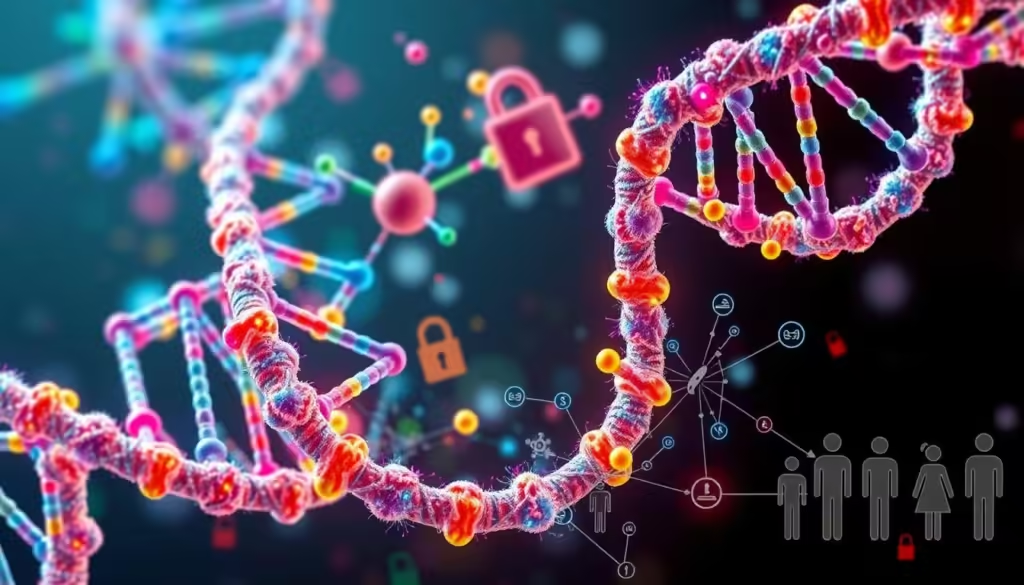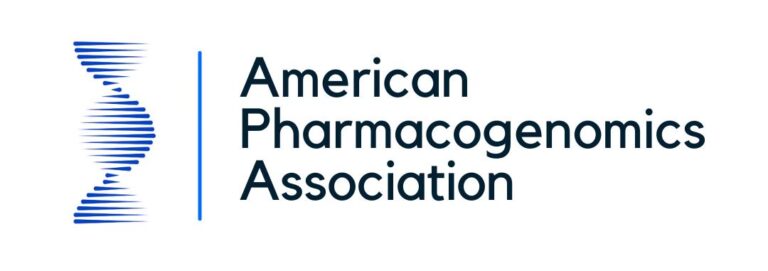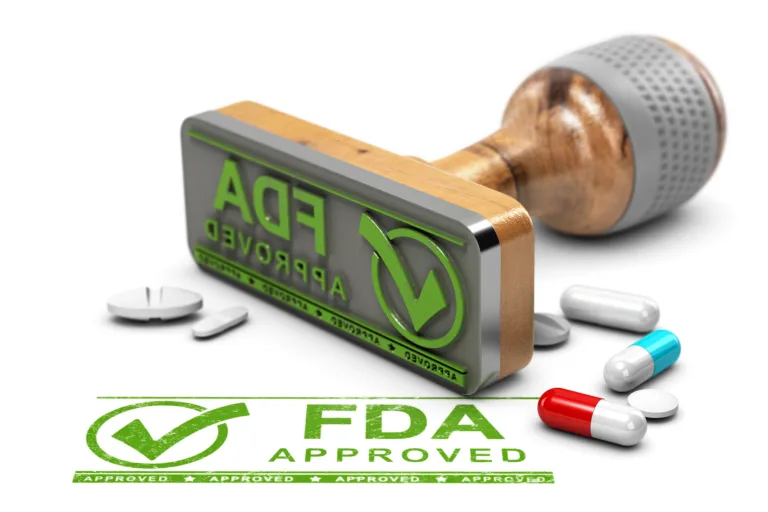Pharmacogenomics, a field that delves into the genetic influence on drug responses, promises to revolutionize personalized medicine. It aims to tailor treatments to an individual’s genetic makeup, enhancing efficacy and reducing adverse reactions. Yet, this burgeoning science confronts us with intricate ethical hurdles concerning privacy, consent, and equitable access. As we tread the path of pharmacogenomics, we must find a precarious equilibrium between innovation and the protection of patient rights and societal welfare.
The swift progress in genetic testing and sequencing heralds a new era in healthcare customization. A 2012 nationwide survey revealed that1 91% of US physicians were already engaging with pharmacogenomic testing, marking a significant trend. The advent of1 affordable genome sequencing has further propelled genomics into clinical realms. Yet, as personalized medicine gains traction, so do the ethical obstacles it poses.

Privacy and informed consent emerge as paramount concerns in pharmacogenomics. Patients must comprehend the implications of genetic testing and the potential misuse of their genetic data. This includes the risks of1 unforeseen findings and the1 complexities of disclosing such information. It is imperative for healthcare professionals and policymakers to navigate these issues, safeguarding patient autonomy and ensuring they can make informed decisions about genetic testing.
The specter of genetic discrimination1 looms large over pharmacogenomics. Ethnically targeted therapies, though potentially beneficial, also spark debates on equitable access. Policymakers face the daunting task of mitigating1 discrimination in healthcare, employment, and insurance. They must ensure that pharmacogenomics’ benefits are universally accessible, transcending genetic predispositions and socioeconomic barriers.
As pharmacogenomics advances, it is crucial for healthcare stakeholders to collaborate in addressing these ethical conundrums. By balancing the promise of personalized medicine with stringent ethical standards, we can unlock pharmacogenomics’ potential to enhance patient care. This endeavor will safeguard individual rights and ensure equitable access to these groundbreaking advancements.
Pharmacogenomics: Transforming Personalized Medicine
Pharmacogenomics has revolutionized personalized medicine, enabling the development of targeted therapies tailored to an individual’s genetic profile2. This scientific discipline encompasses all “-omics” fields, including proteomics, transcriptomics, metabolomics, and metagenomics3. It is transforming the landscape of personalized therapeutics.
Pharmacogenomics and Personalized Therapeutics
By identifying genetic variations in pharmacogenes, which encode drug-metabolizing enzymes, transporters, and receptors, researchers can develop biomarkers to predict drug response and guide treatment decisions. Pharmacogenomics is driving the rapid increase in Food and Drug Administration approvals of personalized therapeutics involving biomarkers23. This showcases the growing impact of this transformative field.
Genetic Variations and Biomarkers in Pharmacogenes
Genetic variations in pharmacogenes can significantly impact drug metabolism, transportation, and receptor binding, leading to differences in drug exposure and response. Researchers have identified numerous clinically relevant genetic biomarkers that can guide the selection and dosing of a wide range of medications, from oncology drugs to cardiovascular therapies. These pharmacogenomic biomarkers are increasingly being incorporated into clinical practice to optimize treatment for individual patients.
Molecularly targeted cancer therapies serve as a beacon for all therapeutic approaches, showcasing trends in drug discovery and clinical applications23. Multicomponent biomarker panels incorporating genetic, personal, and environmental factors are also being utilized to guide diagnosis and therapies23.
While the promise of pharmacogenomics is evident, the clinical application of this field faces hurdles, such as unknown validity across ethnic groups and underlying bias in healthcare systems2. Nonetheless, the rapid advancements in large-scale data repositories are accelerating medical progress in pharmacogenomics23. This is driving the discovery of biomarkers and the development of targeted therapeutics in personalized medicine23.
“Pharmacogenomics is a key driver of personalized medicine, enabling the development of targeted therapies based on an individual’s genetic profile.”
Adverse Drug Reactions and Pharmacogenomic Biomarkers
Adverse drug reactions (ADRs) are a major public health issue, causing hospitalizations, escalating healthcare expenditures, and, tragically, patient fatalities. Pharmacogenomics emerges as a potential remedy by pinpointing genetic predispositions to ADRs, thereby allowing clinicians to circumvent the prescription of potentially harmful medications to specific individuals4.
Pharmacogenomic biomarkers have been linked to heightened ADR risks, such as HLA-B*57:01 with hypersensitivity to abacavir and TPMT variants with thiopurine-induced myelosuppression. Integrating these biomarkers into clinical decision-making can significantly enhance drug safety and patient outcomes.4
Genetic tests for susceptibility to adverse drug reactions have been mandated by pharmaceutical regulations in numerous countries. Personalized medicine, predicated on genetic predisposition to disease, is increasingly applied to a broad spectrum of drugs4. In the United States, drug prescribing guidelines now incorporate cautions on drug-drug and drug-gene interactions, underscoring the critical role of genetic variations in drug metabolism4.
| Pharmacogenomic Biomarker | Associated Adverse Drug Reaction |
|---|---|
| HLA-B*57:01 | Abacavir-induced hypersensitivity |
| TPMT variants | Thiopurine-induced myelosuppression |
As pharmacogenomics advances, the integration of genetic data into clinical practice promises to elevate drug safety and enhance patient outcomes across diverse therapeutic domains4.
“The US FDA has recommended dosage adjustments for antipsychotics and antidepressants based on specific genetic variants within the cytochrome P450 enzyme system.”4
The Promise and Challenges of Genomic Data
The rapid advancement of genomic technologies has led to the generation of vast amounts of genomic data. These data are being collected in large-scale repositories, driving medical innovation5. Repositories like the All of Us Research Program and the UK Biobank enable researchers to uncover new genetic associations. They also develop predictive models for disease risk and treatment response6. However, translating these insights into clinical practice poses a significant challenge. It requires careful consideration of ethical, regulatory, and practical implementation factors.
Large-Scale Data Repositories and Medical Advances
The collection, storage, and use of genomic data raise important ethical and regulatory concerns5. Issues around data privacy, informed consent, and the potential for discrimination based on genetic information must be addressed6. Regulatory frameworks, such as the General Data Protection Regulation (GDPR) in the European Union and the Health Insurance Portability and Accountability Act (HIPAA) in the United States, aim to safeguard individual privacy. They ensure the responsible use of genomic data6. Navigating these ethical and regulatory landscapes is crucial for the successful integration of pharmacogenomics into clinical practice.
Ethical and Regulatory Considerations
The overrepresentation of genomic data from individuals of Northern-European descent in biobanks worldwide remains a significant issue5. Calls have been made to improve diversity in genomic data sources, with diversity often related to genetic ancestry5. The findings mainly stem from authors and workshop experts located in a few countries from the Global North5. The workshop explored the themes generated during the rapid review, focusing on the complexity of the topic concerning the inclusion of historically underserved populations in genomic and health studies5.
Clinical genome and exome sequencing is currently used in only a small fraction of patients6. The United Kingdom’s National Health Service (NHS) aimed to sequence 5 million genomes in the next 5 years starting from October 20186. Genomic data is crucial for expanding diagnoses outside of cancer and rare diseases, including prenatal testing and determining optimal drug therapy6. Large sample sizes are essential for understanding genetic variation and its association with common and complex disorders6. The Genomic Medicine Service requires a centralized dataset containing genotypic and phenotypic information from previous tests6.
Around 8% of the population lacks the enzyme coded by the CYP2DX gene entirely, affecting the metabolization of about a quarter of common medications7. 2% of people have more than two copies of the CYP2DX gene, making them ultra-fast metabolizers7. The HLA system contains over 200 genes, with variants related to adverse reactions to medications like carbamazepine, abacavir, allopurinol, and clozapine7. More than two-thirds of the first 10,000 patients in the PREDICT programme had at least one actionable variant affecting warfarin sensitivity, and variability in the stable dose of warfarin for different patients can be as much as 40-fold when considering factors like genomic variants, weight, and age7.
“The ethical obligation to share genomic information is grounded in considerations of fairness. Patients undergoing clinical genomic testing are required to allow their genomic data to be incorporated into a genomic dataset for maximizing public benefit.”
Ethical Dilemmas in Pharmacogenomics
Pharmacogenomics, the study of how genetic variations influence drug response, has revolutionized personalized medicine8. This field, however, raises significant ethical concerns that necessitate careful navigation. Informed consent and privacy are paramount, as patients must be fully aware of the implications of genetic testing. The potential impact on their personal and familial lives is substantial9. Furthermore, the storage and sharing of genetic data must be managed responsibly to safeguard individual privacy and prevent misuse of this sensitive information.
Equitable access to the benefits of pharmacogenomics is another pressing issue. Discriminatory practices based on genetic information have been documented, leading to the enactment of the Genetic Information Nondiscrimination Act in 20088. Concerns persist that the advantages of personalized medicine may disproportionately favor certain socioeconomic and demographic groups. This could exacerbate existing health disparities9. Ensuring that the promise of pharmacogenomics is realized for all, regardless of race, ethnicity, or socioeconomic status, is a critical challenge. It must be addressed through policy, education, and targeted interventions.
Informed Consent and Privacy Concerns
The collection and use of genetic information in pharmacogenomics raise significant informed consent and privacy concerns. Patients must be fully informed about the implications of genetic testing. The potential for incidental findings that may have personal and familial implications is substantial8. Additionally, the storage and sharing of genomic data must be carefully managed. This is to protect individual privacy and prevent the misuse of this sensitive information9.
Discrimination Risks and Equitable Access
Pharmacogenomics has the potential to exacerbate existing health disparities if access to these personalized treatments is not equitably distributed8. There are concerns that genetic information could be used to discriminate against individuals or certain populations. This could affect their access to healthcare, insurance, and employment8. Ensuring that the benefits of pharmacogenomics are accessible to all, regardless of socioeconomic status, race, or ethnicity, is a critical challenge. It must be addressed through policy, education, and targeted interventions9.
“Balancing the benefits of pharmacogenomics with the ethical obligations to respect patient autonomy and data privacy is a critical challenge facing the field.”
The ethical dilemmas in pharmacogenomics highlight the complex interplay between innovation, privacy, and equity8910. As the field continues to evolve, it is essential that policymakers, healthcare providers, and the research community collaborate to address these challenges. Ensuring that the transformative potential of personalized medicine is realized in a responsible and equitable manner is paramount.
Regulatory Challenges and Data Sharing
The integration of pharmacogenomics into clinical practice encounters significant regulatory challenges. Establishing clear guidelines for the validation, interpretation, and clinical implementation of pharmacogenomic biomarkers11 is imperative. Overcoming these regulatory hurdles is critical for the widespread adoption of personalized medicine based on pharmacogenomics11.
The sharing of genomic data across research institutions and healthcare systems is vital for advancing pharmacogenomics11. However, this must be balanced with patient privacy and data security concerns11. International guidelines, such as the UNESCO International Declaration on human genetic data and the European Data Protection Directive, provide a framework for addressing these ethical considerations11.
Researchers from diverse institutions have collaborated to address the ethical and data protection challenges in pharmacogenetic research1112. They have highlighted challenges and solutions, underscoring the need for continued dialogue and policymaking. This ensures the responsible and equitable advancement of personalized medicine11.
| Regulatory Landscape | Key Considerations |
|---|---|
|
|
The regulatory landscape for pharmacogenomics is intricate, with numerous international guidelines and directives aimed at addressing ethical, legal, and social implications11. Navigating these regulatory challenges and establishing effective data sharing practices are crucial. They will be essential for the successful integration of pharmacogenomics into mainstream personalized medicine111213.
Genetic Counseling and Patient Education
The integration of pharmacogenomics into clinical practice necessitates robust genetic counseling and patient education. Healthcare providers must possess the capability to decipher and convey intricate genetic data to patients. This ensures that individuals grasp the nuances of pharmacogenomic testing and its potential repercussions on their treatment regimens14. Moreover, fostering patient empowerment to actively engage in their healthcare decisions is paramount. This empowerment enables individuals to make informed choices regarding personalized therapies, thereby facilitating the seamless incorporation of pharmacogenomics into the healthcare paradigm14.
Research indicates that approximately 20% of children have been prescribed medication within the past year15. Notably, the prevalence of prescription medication use among children has witnessed a decline from 25% in the period spanning 1999-2002 to 22% between 2011-201415. However, infants and toddlers exhibit heightened vulnerability to drug toxicity due to their slower metabolism and elimination rates, underscoring the critical need for enhanced medication safety and efficacy15. The influence of pharmacogenomic variants on both the safety and efficacy of medications for both the mother and newborn necessitates meticulous consideration during treatment15.
Genetic testing for pharmacogenomics (PGx) raises significant ethical concerns for patients, healthcare providers, and society at large14. The privacy implications of PGx testing diverge from those of traditional diagnostic genetic testing, as PGx testing is not aimed at revealing disease risk information14. The Genetic Information Nondiscrimination Act of 2008 (GINA) safeguards individuals against discrimination based on genetic information, specifically in the realms of health insurance and employment14. Privacy regulations such as HIPAA govern the sharing and utilization of genetic and PGx data14.
Autonomy emerges as a pivotal ethical consideration in the realm of genetic testing and PGx information sharing, underscoring an individual’s autonomy to dictate access to their genetic information14. Confidentiality of a patient’s genetic or PGx data is paramount, with breaches permissible only in extraordinary circumstances to avert harm to others14. The ethical principle of autonomy significantly influences an individual’s decision-making regarding medication use, weighing potential benefits against risks14.

To address these ethical concerns, the provision of comprehensive genetic counseling and patient education becomes imperative. Healthcare professionals must be trained to effectively communicate complex pharmacogenomic information. This empowerment enables patients to make informed decisions regarding their personalized treatment options15148.
| Statistic | Value |
|---|---|
| Prescription medication use in children (1999-2002) | 25%15 |
| Prescription medication use in children (2011-2014) | 22%15 |
| Medication use in adolescents aged 13-19 years | 23%15 |
| Medication use in infants and toddlers aged 0-5 years | 15%15 |
| Maternal medication use during pregnancy (Australia) | 28%15 |
| Maternal medication use during pregnancy (US) | 97%15 |
| Maternal medication use postpartum | 34% to 100%15 |
| Prevalence of CYP2D6 genetic variations linked to ultra-rapid metabolism | 1 to 28 per 100 individuals15 |
“Pharmacists are recognized as leaders in clinical pharmacogenomics and can educate patients about genetic information and related laws.”8
Through the provision of thorough genetic counseling and patient education, healthcare professionals can ensure that individuals fully comprehend the implications of pharmacogenomic testing. This comprehension enables individuals to make informed decisions regarding their personalized treatment, thereby enhancing health outcomes and patient engagement15148.
Inclusivity and Diversity in Genomic Research
The field of pharmacogenomics faces a significant challenge: the lack of diversity and representation in genomic research16. In 2009, a staggering 96% of genomic studies were conducted in populations of European descent16. By 2016, the proportion of genome-wide association studies (GWAS) in samples from underrepresented populations had marginally increased to 19%, predominantly in Asian ancestry samples16. Conversely, ethnic groups such as African Americans and Latinos saw minimal increases, ranging from 1 to 4%16.
Addressing Racial and Ethnic Disparities
The underrepresentation of diverse populations in genomic research poses a critical concern. It can result in biomarkers and therapeutic interventions less applicable to underrepresented racial and ethnic groups16. The NIH mandated inclusion of diverse populations in 1993, yet participation in health-related genetic research among ethnic groups with significant disparities remained limited16. Scholars have underscored research norms that inadequately prioritize the collection, annotation, and reporting of genomic variation among diverse populations16.
Ensuring equitable distribution of personalized medicine benefits necessitates addressing the “input-output problem”1617. Rare variants identified by whole genome sequencing (WGS) can alter the interpretation of metabolizer status in 1% of the cohort, and rare variants in pharmacogenes account for approximately 30-40% of functional pharmacogenetic (PGx) variation17. Identifying these rare variants and understanding their impact on drug response is crucial for developing personalized treatment approaches that are applicable to diverse populations1617.
Genomic research has identified variants in APOL1 associated with a higher risk of kidney disease in individuals with African ancestry, with odds ratios as high as 89 for certain populations16. Similarly, rare nonsense variants in PCSK9 found in higher frequency in African Americans are linked to a dramatic reduction in low-density lipoprotein cholesterol concentration (LDLC) and coronary heart disease risk16. Efforts to exploit genetic variations in PCSK9 pharmacologically have led to the approval of monoclonal antibody inhibitors for reducing LDLC and cardiovascular risk16.
However, the underrepresentation of diverse populations in genomic research remains a significant barrier to the equitable distribution of personalized medicine benefits18. Low-income communities, including ethnic minority and indigenous backgrounds, historically are those with the greatest need but least to benefit from clinical genetic services and genomic research18. Mistrust from historical malpractices also affects the willingness of underserved communities, minority, and indigenous populations to participate in genetic testing and research18.
Addressing these challenges requires a multifaceted approach, including community engagement, effective communication strategies, and outreach programs to promote genetic literacy and reduce barriers to participation18. By actively including diverse populations in genomic studies, researchers can ensure that the promise of personalized medicine is realized for all, regardless of race or ethnicity161718.
The Economics of Pharmacogenomics
The integration of pharmacogenomics into clinical settings presents profound economic considerations. Personalized treatments, though promising in enhancing patient outcomes and minimizing adverse drug reactions, incur initial costs for genetic testing and targeted therapies19. These expenses are considerable, posing a significant challenge to the financial sustainability of healthcare systems.
Healthcare policymakers and systems must rigorously assess the cost-effectiveness of pharmacogenomic interventions. It is imperative to prevent these economic hurdles from widening existing healthcare disparities20. Overcoming these financial obstacles is essential for the widespread adoption and equitable provision of personalized medicine.
The financial toll of adverse drug reactions is alarming, with severe ADRs leading to approximately 100,000 deaths and a $100 billion annual cost in the U.S21. Pharmacogenomic testing offers a potential solution by identifying at-risk individuals and guiding more precise prescribing practices21.
Furthermore, the efficacy of drugs intended for the general population is limited, with only 60% of patients benefiting at best21. Pharmacogenomics has the potential to enhance treatment efficacy and diminish the economic burden of ineffective treatments.
| Benefit | Challenge |
|---|---|
| Reduced adverse drug reactions and associated costs | High upfront costs of genetic testing and targeted therapy development |
| Improved treatment effectiveness and reduced wasted resources | Potential for exacerbating healthcare disparities if access is unequal |
| Increased productivity and reduced missed work due to ineffective drugs | Complexity of economic evaluation and cost-effectiveness analysis |
As pharmacogenomics advances, collaborative efforts among policymakers, healthcare professionals, and researchers are crucial. They must address economic hurdles to ensure the equitable implementation of personalized medicine20.
The economic dimensions of pharmacogenomics are complex, encompassing both opportunities and challenges that demand meticulous consideration192021. By navigating these complexities, we can realize the full potential of personalized therapies. This will enhance the efficiency and equity of healthcare systems.
Artificial Intelligence and Multicomponent Biomarker Panels
The intricacies of human biology and the multifaceted nature of disease and drug response have necessitated the creation of multicomponent biomarker panels. These panels integrate genetic, environmental, and personal factors to inform treatment choices22. Artificial intelligence (AI) and machine learning are being employed to dissect these intricate data sets. They aim to unearth novel biomarkers and predictive models23. The synergy between AI and multicomponent biomarker panels is poised to revolutionize pharmacogenomics and personalized medicine. Nonetheless, it also introduces ethical and practical hurdles.
Precision medicine leverages patients’ unique genetic and genomic profiles for healthcare decisions23. Nonetheless, the ethical, legal, and social implications in the U.S. demand meticulous consideration when dealing with genetic/genomic information23. Patient trust in laboratory-developed tests (LDTs) is a concern, stemming from historical injustices, lack of equity awareness, and regulatory ambiguities23. AI and machine learning, however, offer a potential solution. They can identify fraud, waste, and abuse in healthcare, enhancing the reliability and trustworthiness of multicomponent biomarker panels23.
Despite the hurdles, the potential of AI-driven multicomponent biomarker panels for advancing personalized medicine and pharmacogenomics remains robust. As researchers and healthcare providers delve into this cutting-edge field, they must confront the complex ethical, regulatory, and practical challenges. This is essential to ensure that the advantages of this technology are equitably and responsibly harnessed.
Source Links
- Ethical, legal and social implications of incorporating personalized medicine into healthcare – https://www.ncbi.nlm.nih.gov/pmc/articles/PMC4296905/
- Pharmacogenomics: Driving Personalized Medicine – PubMed – https://pubmed.ncbi.nlm.nih.gov/36927888/
- Pharmacogenomics: Driving Personalized Medicine – https://pharmrev.aspetjournals.org/content/75/4/789.abstract
- Ethical and public policy challenges for pharmacogenomics – https://www.ncbi.nlm.nih.gov/pmc/articles/PMC4336925/
- The ethical challenges of diversifying genomic data: A qualitative evidence synthesis – https://www.ncbi.nlm.nih.gov/pmc/articles/PMC10953735/
- Rethinking the ethical principles of genomic medicine services – European Journal of Human Genetics – https://www.nature.com/articles/s41431-019-0507-1
- Pharmacogenomics: three challenges to the NHS – Genomics Education Programme – https://www.genomicseducation.hee.nhs.uk/blog/pharmacogenomics-three-challenges-to-the-nhs/
- Ethical Issues in Pharmacogenomics – https://www.pharmacytimes.com/view/ethical-issues-in-pharmacogenomics
- Pharmacogenomics, Ethics, and Public Policy – https://www.scu.edu/ethics/focus-areas/bioethics/resources/pharmacogenomics-ethics-and-public-policy/
- Pharmacogenetics: the ethical issues – The Pharmacogenomics Journal – https://www.nature.com/articles/6500159
- Pharmacogenetic research and data protection – challenges and solutions – The Pharmacogenomics Journal – https://www.nature.com/articles/6500372
- Current challenges and opportunities for pharmacogenomics: perspective of the Industry Pharmacogenomics Working Group (I-PWG) – Human Genetics – https://link.springer.com/article/10.1007/s00439-021-02282-3
- PDF – https://www.nuffieldbioethics.org/assets/pdfs/pharm_short_version-FINAL-updated-2006.pdf
- Personalizing Personalized Medicine: The Confluence of Pharmacogenomics, a Person’s Medication Experience and Ethics – https://www.mdpi.com/2226-4787/11/3/101
- Pharmacogenomic Testing In Pediatrics: Navigating The Ethical, Social, | PGPM – https://www.dovepress.com/pharmacogenomic-testing-in-pediatrics-navigating-the-ethical-social-an-peer-reviewed-fulltext-article-PGPM
- Diversity and inclusion in genomic research: why the uneven progress? – https://www.ncbi.nlm.nih.gov/pmc/articles/PMC5614884/
- A call for increased inclusivity and global representation in pharmacogenetic testing – npj Genomic Medicine – https://www.nature.com/articles/s41525-024-00403-1
- Inclusion of diverse populations in genomic research and health services: Genomix workshop report – https://www.ncbi.nlm.nih.gov/pmc/articles/PMC5614885/
- Ethical Issues in Pharmacogenomics – https://link.springer.com/chapter/10.1007/978-3-031-45903-0_19
- Does pharmacogenomics provide an ethical challenge to the utilisation of cost-effectiveness analysis by public health systems? – PubMed – https://pubmed.ncbi.nlm.nih.gov/15896096/
- Pharmacogenomics: Revolution in a Bottle? – https://journalofethics.ama-assn.org/article/pharmacogenomics-revolution-bottle/2002-03
- Assessing the Implementation of Pharmacogenomic Panel-Testing in Primary Care in the Netherlands Utilizing a Theoretical Framework – https://www.mdpi.com/2077-0383/9/3/814
- Frontiers | Patient safety and healthcare quality of U.S. laboratory developed tests (LDTs) in the AI/ML era of precision medicine – https://www.frontiersin.org/journals/molecular-biosciences/articles/10.3389/fmolb.2024.1407513/full






One Comment